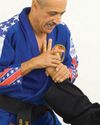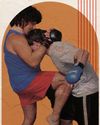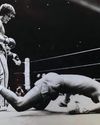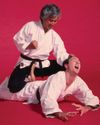
After coining the term jeet kune do in 1967, Bruce Lee continued to evolve his style and his thinking, so much so that the jeet kune do of 1967 would not closely resemble the jeet kune do of the early 1970s. “Jeet kune do is the art not founded on techniques or doctrine, ” Lee wrote. “[It] is not a matter of petty technique ... [nor] a matter of seeking knowledge or accumulating stylized patterns but discovering the cause of ignorance.”
Ted Wong noted that the original curriculum (which included chi sao, bai jong, the pak sao/lop sao patterns and so on) developed for the Chinatown and Oakland branch schools drew heavily on Lee’s early wing chun technique modifications. However, by 1970, he’d determined that the curriculum should no longer be taught as JKD.
In a 1971 phone conversation with Daniel Lee, Bruce unapologetically stated, “That’s why I’ve disbanded all the schools of jeet kune do — because it is very easy for a member to come in and take the agenda as the ‘truth’ and the schedule as the ‘way.’ You know what I mean?”
He recognized the fact that the original JKD curriculum had become stylized. Further, he didn’t approve of identifying the curriculum as JKD. To set the record straight, he wrote in the September 1971 issue of Black Belt: “Let it be understood once and for all that I have not invented a new style, composite or modification. I have in no way set jeet kune do within a distinct form governed by laws that distinguish it from ‘this’ style or ‘that’ method.”
In effect, Lee had officially distanced himself from the original curriculum, which he believed had been crystalized into a style. Jeet kune do had entered a new phase.
Diese Geschichte stammt aus der Black Belt Spring 2023-Ausgabe von Black Belt.
Starten Sie Ihre 7-tägige kostenlose Testversion von Magzter GOLD, um auf Tausende kuratierte Premium-Storys sowie über 8.000 Zeitschriften und Zeitungen zuzugreifen.
Bereits Abonnent ? Anmelden
Diese Geschichte stammt aus der Black Belt Spring 2023-Ausgabe von Black Belt.
Starten Sie Ihre 7-tägige kostenlose Testversion von Magzter GOLD, um auf Tausende kuratierte Premium-Storys sowie über 8.000 Zeitschriften und Zeitungen zuzugreifen.
Bereits Abonnent? Anmelden

HOW TO CREATE A MARTIAL ART CASE STUDY: COMBAT HAPKIDO
On October 22, 2022, the International Combat Hapkido Federation celebrated its 30th anniversary. As you might expect, we're proud of our organization's longevity, stability and success.

MARTIAL ARTS ANATOMY 101
PHYSIOLOGY OF THE LIVER SHO

LOCK UP
THE CLINCHING LESSONS TAUGHT IN THE ANCIENT GREEK MARTIAL ART OF PANKRATION ARE STILL RELEVANT - AND EFFECTIVE!

KILLER CHARACTER ACTOR
When Scott Adkins Isn't Headlining His Own Action Movies Like \"Boyka: Undisputed,\" He's Stealing Scenes in Blockbusters Like \"John Wick\" and \"Ip Man\"!

A DEEP DIVE WITH BENNY URQUIDEZ
Few fighters have a reputation as formidable and a record as impressive as Benny “The Jet” Urquidez. As you will see, his path from the traditional martial arts to full contact and then to kickboxing had more than its share of bumps.

PRE-EMPTIVE STRIKES: THE GOOD, THE BAD AND THE UGLY, PART 1
In my six previous columns, pre-emptive striking featured prominently.

THE DAY JUJITSU DIED
Let us look at one historical instance that illuminates a lesson in task saturation, or what Miyamoto Musashi called \"sword flowers.\"

WHERE ARE THEY NOW? GUY MEZGER: FROM MMA FIGHTER TO HEALER
To be successful in mixed martial arts nowadays, you need an all-around game.

KILLER INSTINCT
It's not the size of the woman in the fight but the size of the fight in the woman.

HAPKIDO'S BONG SOO HAN: THE MAKING OF A MARTIAL ARTS LEGEND
Much has been written about Bong Soo Han (1933-2007), his career as a hapkido master and his connection to the Billy Jack films.